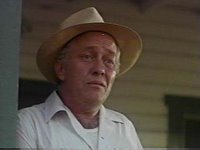So many of you have posted tributes to Paul Newman, and I would just be repeating what you've said if I wrote my own. So here is a repeat of a movie review I wrote nearly two years ago.
 Cool Hand Luke (1967) is the story of Luke Jackson (Paul Newman), a man with no apparent direction in life and no apparent ambition. He's just settling an old score. After a stint in the US Army in which he was promoted and honored with various medals but then demoted so that he left with the same stripe he went in with, he got drunk, broke the heads off of parking meters, and was sent to a work prison in Florida.
Cool Hand Luke (1967) is the story of Luke Jackson (Paul Newman), a man with no apparent direction in life and no apparent ambition. He's just settling an old score. After a stint in the US Army in which he was promoted and honored with various medals but then demoted so that he left with the same stripe he went in with, he got drunk, broke the heads off of parking meters, and was sent to a work prison in Florida.
 This prison is run by Captain, an overseer of sorts played by Strother Martin. More people than I can count have tried imitating Martin in delivering one of the greatest lines in American film history--"What we have here is a failure to communicate"--but they all fail. No one can deliver that line with the same thin Southern drawl--a hint of evil and a hint of feigned benevolence.
This prison is run by Captain, an overseer of sorts played by Strother Martin. More people than I can count have tried imitating Martin in delivering one of the greatest lines in American film history--"What we have here is a failure to communicate"--but they all fail. No one can deliver that line with the same thin Southern drawl--a hint of evil and a hint of feigned benevolence.
Luke enters this prison as a man just "passin' the time." He may bend to authority when necessary, but he can't be broken. There lies the conflict--in order to keep these men in order, Captain and the Boss have to break them, have to keep them in line. Break one rule, and you spend a night in the box. Luke does what he's told for the time being, all the while planning his escape. Upon his capture, he is forced to dig a ditch over and over again until the authorities perceive that he is sufficiently broken.
 Almost from the day he is linked to the chain gang, Luke becomes the hero to the other inmates. He is the cool hand, the one who cannot be broken. He eats 50 eggs. He survives consecutive nights in the box. He escapes and lives it up with beautiful women. When they witness the end of their Cool Hand, and he becomes just another shovel-toting prisoner, they are left without a savior.
Almost from the day he is linked to the chain gang, Luke becomes the hero to the other inmates. He is the cool hand, the one who cannot be broken. He eats 50 eggs. He survives consecutive nights in the box. He escapes and lives it up with beautiful women. When they witness the end of their Cool Hand, and he becomes just another shovel-toting prisoner, they are left without a savior.
There are so many memorable scenes--a visit from Luke's ailing mother, the slutty country girl washing her car in front of the chain gang, Luke's mournful singing of Plastic Jesus when his mother dies, the bloody fight between Luke and Dragline (George Kennedy) that was so painful to watch that near the end you felt every blow, Luke's battle with God who he isn't even sure exists--but none of these makes this a classic.
Why is Cool Hand Luke a true American classic? I think it's because we love our anti-heroes. We love to question authority. And we love to love those who don't want to be loved, those who are just passin' the time and will bend but will not break.
Addition: The green words are links to audio clips, just in case you missed that extra treat.
 Cool Hand Luke (1967) is the story of Luke Jackson (Paul Newman), a man with no apparent direction in life and no apparent ambition. He's just settling an old score. After a stint in the US Army in which he was promoted and honored with various medals but then demoted so that he left with the same stripe he went in with, he got drunk, broke the heads off of parking meters, and was sent to a work prison in Florida.
Cool Hand Luke (1967) is the story of Luke Jackson (Paul Newman), a man with no apparent direction in life and no apparent ambition. He's just settling an old score. After a stint in the US Army in which he was promoted and honored with various medals but then demoted so that he left with the same stripe he went in with, he got drunk, broke the heads off of parking meters, and was sent to a work prison in Florida. This prison is run by Captain, an overseer of sorts played by Strother Martin. More people than I can count have tried imitating Martin in delivering one of the greatest lines in American film history--"What we have here is a failure to communicate"--but they all fail. No one can deliver that line with the same thin Southern drawl--a hint of evil and a hint of feigned benevolence.
This prison is run by Captain, an overseer of sorts played by Strother Martin. More people than I can count have tried imitating Martin in delivering one of the greatest lines in American film history--"What we have here is a failure to communicate"--but they all fail. No one can deliver that line with the same thin Southern drawl--a hint of evil and a hint of feigned benevolence.Luke enters this prison as a man just "passin' the time." He may bend to authority when necessary, but he can't be broken. There lies the conflict--in order to keep these men in order, Captain and the Boss have to break them, have to keep them in line. Break one rule, and you spend a night in the box. Luke does what he's told for the time being, all the while planning his escape. Upon his capture, he is forced to dig a ditch over and over again until the authorities perceive that he is sufficiently broken.
 Almost from the day he is linked to the chain gang, Luke becomes the hero to the other inmates. He is the cool hand, the one who cannot be broken. He eats 50 eggs. He survives consecutive nights in the box. He escapes and lives it up with beautiful women. When they witness the end of their Cool Hand, and he becomes just another shovel-toting prisoner, they are left without a savior.
Almost from the day he is linked to the chain gang, Luke becomes the hero to the other inmates. He is the cool hand, the one who cannot be broken. He eats 50 eggs. He survives consecutive nights in the box. He escapes and lives it up with beautiful women. When they witness the end of their Cool Hand, and he becomes just another shovel-toting prisoner, they are left without a savior.There are so many memorable scenes--a visit from Luke's ailing mother, the slutty country girl washing her car in front of the chain gang, Luke's mournful singing of Plastic Jesus when his mother dies, the bloody fight between Luke and Dragline (George Kennedy) that was so painful to watch that near the end you felt every blow, Luke's battle with God who he isn't even sure exists--but none of these makes this a classic.
Why is Cool Hand Luke a true American classic? I think it's because we love our anti-heroes. We love to question authority. And we love to love those who don't want to be loved, those who are just passin' the time and will bend but will not break.
Addition: The green words are links to audio clips, just in case you missed that extra treat.
Comments
I watched this again yesterday and it is as fresh and awesome as the very first time I saw it decades ago.
So many good ones have him in them...
Good night Luke!!!